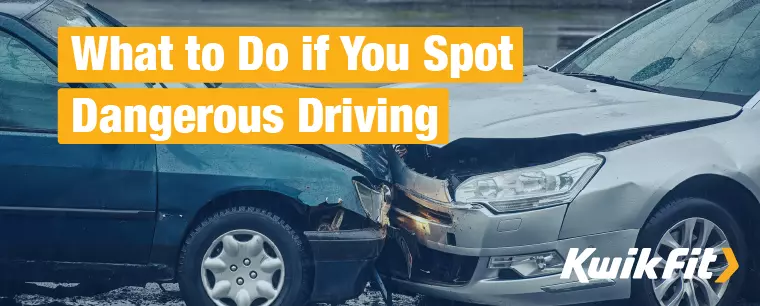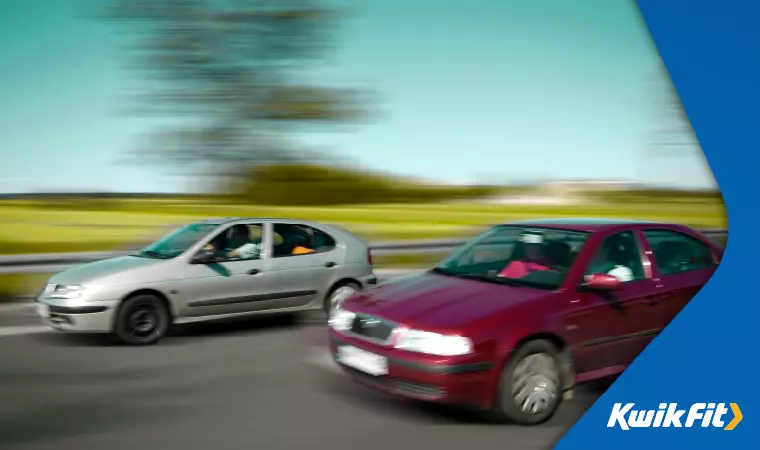What to Do if You Spot Dangerous Driving
Jack Dreyer | Friday 10th March 2023 12:00pm

Itís not uncommon to pass your test, having just faced the excruciating inspection of every breath you take while driving, and then suddenly realise that (seemingly) everyone on the road drives terribly! From not indicating, to speeding well past the limits, the open road can be quite scary.
But itís not just a problem for the driver Ė dangerous driving is called that precisely because itís dangerous to the driver and other road users (not to mention pedestrians).
Itís important, then, to know what you should do if you spot dangerous driving.
How to report dangerous driving
If thereís an immediate danger, then call the police on the emergency 999 number (being sure that you are parked in a safe spot first). For the majority of dangerous driving reports, though, you should instead call the non-emergency police number 101.
,p>Be aware that reporting a driver, especially without any evidence, may require you to appear in court to testify as a witness. But donít let that put you off ó driving in a way that endangers road users has the very real potential to cause serious and fatal injuries.
Types of dangerous driving

The most commonly serious types of dangerous driving are speeding, driving while intoxicated, distracted driving (such as talking on the phone or texting), and aggressive or reckless driving.
Letís look in some more detail at what qualifies for each of these categories.
Speeding
This is the easiest to spot Ė exceeding the speed limit on any road is classed as speeding. This is quite clear cut. The speed limits exist in areas in order to keep everybody safe. Exceeding them means that youíre not only less likely to be able to react in time to typical hazards of that type of road (like school children, crossing animals, and so on), but will be travelling at a different speed relative to other drivers.
Going 50mph on a 30mph road, for example, may seem completely fine on an empty stretch, but thereís every chance that a bend hides somebody travelling at the correct speed Ė which could then force you to have to swerve to avoid hitting the back of them.
Driving while intoxicated
Any intoxication is unacceptable while driving. You have a moral responsibility to be in control of your vehicle at all times, for everybodyís safety. So driving while under the influence of drugs or alcohol can result in serious fines, having your licence revoked, or worse.
Distracted driving
This is a bit more ambiguous, but distracted driving can result in a Fixed Penalty Notice. Itís illegal to hold your phone while driving Ė so having a phone conversation without your phone in hands-free mode can make it very difficult to notice hazards and react to them in time.
Aggressive or reckless driving
Everyoneís experienced the sheer rage of being tailgated by an aggressive driver Ė even worse when youíre going at the speed limit. This bad habit not only puts the tailgater at risk of going into the back of the driver in front, but often distracts the driver in front by taking up their rear-view mirror. Though itís worth noting here that some rear-view mirrors magnify the view, so the driver behind may not be as close as they seem.
Aggressive driving puts everyone at risk.
When should you report dangerous driving?
Itís worth being mindful of not over-reporting, it can be a waste of police time if youíre reporting someone for going marginally over the speed limit, for example. But if you feel that someone is driving in a way that poses a real threat to other road users and pedestrians, then filing a report can help keep the streets safe.
For car safety beyond etiquette and driving habits, rely on Kwik Fit to keep your vehicle running as smoothly as possible.
Any facts, figures and prices shown in our blog articles are correct at time of publication.
Featured Articles
Is it Illegal to Drive With One Headlight?
Saturday 19th July 2025
Wondering if itís illegal to drive with one headlight? Learn about the safety risks and penalties of illegal blown bulbs and why you should fix them promptly.
Air Con in EVs & Hybrids: Experts Answer Your Questions
Monday 30th June 2025
Does air con drain EV batteries? Can you use the air con while charging an electric car? Find out the answers to these questions & more from Kwik Fitís experts.
Why Is Your Car Making a Noise? Fixes & Tips
Friday 13th June 2025
When your car starts making unexpected noises, it can certainly be quite disconcerting; it may be nothing to worry about, but hereís what you need to know.









